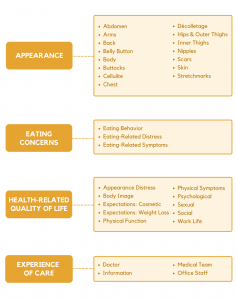Research
Recommended as the most suitable PRO instrument for bariatric and body contouring surgery in a systematic review.
BODY-Q scales were developed from concept elicitation interviews with people undergoing weight loss treatments and body contouring to remove excess skin after massive weight loss and for cosmetic reasons. The BODY-Q was then field-tested in an international sample.

The BODY-Q includes an obesity-specific symptom checklist and 29 independently functioning scales that measure 4 overarching domains. The variety of scales provides flexibility to choose the subset of scales best suited to measure the outcomes of interest in any given study or clinical situation.
Recommended as the most suitable PRO instrument for bariatric and body contouring surgery in a systematic review.
Used in international clinical studies of weight loss and body contouring.
Included in ICHOM Adult Obesity Standard Set to enable hospitals around the world to compare outcomes.
Used in bariatric and body contouring programs to inform clinical care.
The BODY-Q is a rigorously designed patient-reported outcome measure that can be used to evaluate outcomes for obesity, weight loss treatments (e.g., diet, exercise, and bariatric surgery/medicine), and body contouring to remove excess skin after massive weight loss and for cosmetic reasons. The BODY-Q measures 4 overarching domains. Each domain includes 4 or more independently functioning scales. Clinicians and researchers are able to administer the subset of scales relevant to their situation.
Nine scales measure satisfaction with how the body and specific parts of the body (e.g., abdomen, arms, chest) look. Four scales measures how bothered someone is by the appearance of cellulite, stretch marks, excess skin, and body contouring scars. New scales measure the décolletage and belly button.
Two scales measure expectations and appearance-related distress and are specific to patients seeking cosmetic treatments. The remaining 5 scales and an obesity-specific symptom checklist measure health-related quality of life concerns in obesity, weight loss treatments and body contouring.
Five new scales were recently field-tested with 4004 participants in 4 countries. These scales measure eating-related concerns for people who undergo weight loss treatment (e.g., bariatric surgery). Scale concepts include weight loss expectations, eating behaviors, distress, symptoms, and work life.
Four scales measure patients’ experience of healthcare. The first scale measures satisfaction with information and the other 3 scales measure satisfaction with members of the healthcare team, i.e., surgeon, medical team, and office staff.



